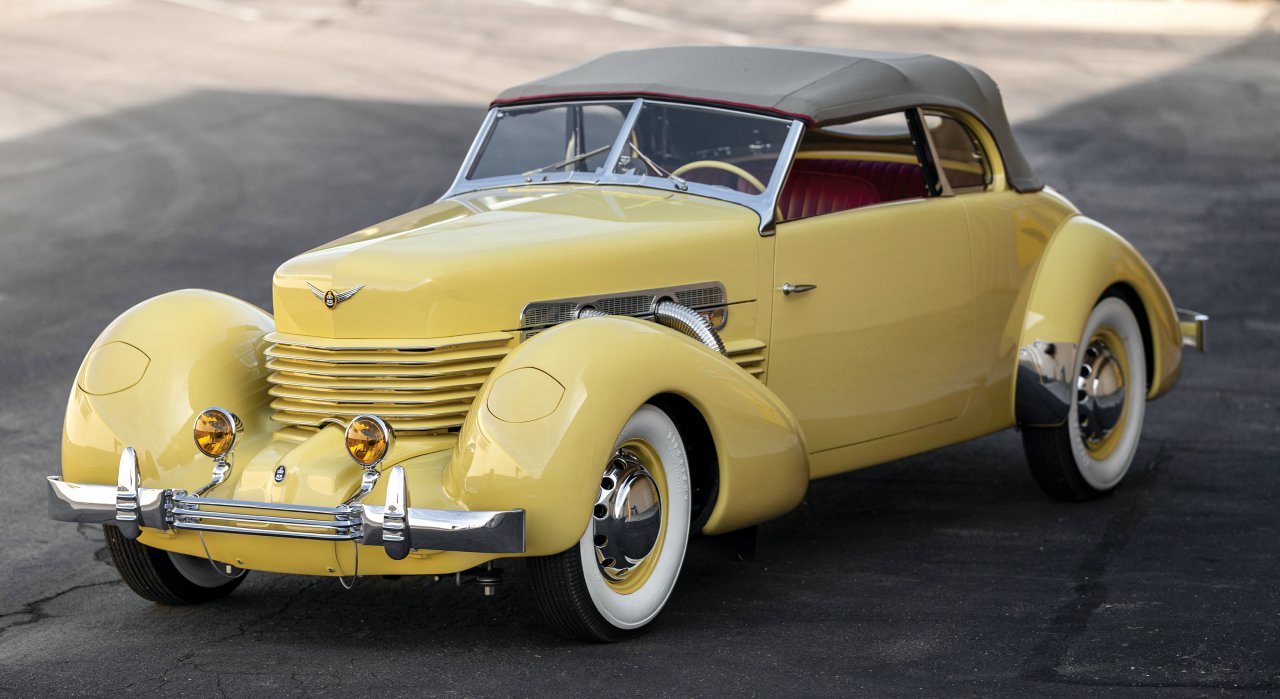(Editor’s note: During the month of May, the ClassicCars.com Journal is publishing a series of stories about buying your first, or perhaps your next, collector vehicle. Today, East Coast editor and collector car market analyst Andy Reid takes a look at buying that car at a collector car auction. If you have a story about your experience buying your first collector car that you’d like to share, please send it to us at [email protected].)
One of the most fun, interesting, challenging but satisfying ways to buy a collector car is at a live auction. There is something about the energy in the room and the people around you, some of them who may be bidding against you, that makes the entire process feel like a much bigger deal than simply buying a car. It can be fun, but there is a lot to know if you want to do this successfully and buy the correct car.
Live auctions offer a number of advantages over any other kind of collector car marketplace in the world. You often can find cars at auction that you cannot find elsewhere. Special cars, cars with storied history, and many top-tier collector cars are sold at live auction in greater numbers than they are sold in the standard person-to-person market or even at by top-tier collector car dealers.
Next, auctions have a large number of cars offered at the same place at the same time, giving you a greater breadth and depth of classic car offerings.
A third reason for buying at auction is that it can be a lot of fun. The process of bidding and hoping to be the final and winning bidder can be as exciting as it is nerve wracking.
Finally, you can sometimes find an amazing deal at an auction, especially if it is the wrong car at the wrong auction, such as a 1977 Porsche Euro Carrera at an auction that primarily sells muscle cars.
But there are some things to consider before buying at auction, which can be a successful adventure if you do your homework — and a disaster if you don’t.
Following is a list of tips to consider when buying at auction.
Before you bid:
- First and foremost, I would not ever recommend buying at auction if you have never attended a classic car auction before. There is a lot to know and it is very easy for a first-time auction attendee to get excited and bid more for a car than it is worth.
- Pre-register for the auction. Information and various forms usually are available through an auction company’s website. You not only need to purchase a bidder’s number but provide proof that you can pay for your purchases. Pre-registering can save time and sometimes even money (some auction companies charge a lower bidder fee to those who do pre-registration). Doing so also gives you more time to examine the car or cars you are considering instead of waiting in a long registration line at the auction site.
- Be sure that an auction is the correct place to buy the car you are considering. If you are looking for an MGB, Porsche 944 or other entry-level classic car, buying at auction is not likely to be the place to find the best car for the best price. More common classic cars can sell for much more than they sell for at dealers or through person to person sales when they appear at classic car auctions, so if you are looking for a more common car, consider advertisements on ClassiccCars.com and other such sites. As a rule of thumb, cars costing less than $20,000 are generally not the right cars to buy at an auction.
- When thinking about buying at auction, be sure to research the cars before the auction. Go to the auction website and read every part of the description thoroughly. While reading, look as much for what you do not see in the description as for what you do see. If the catalog does not explicitly state that it is a matching-numbers car, there is a good chance that it is not. However, this is not always the case. If in doubt, ask; often people assume a car is not a matching-number example because they do not do the research beforehand, and such cars can end up being a good deal .
- Do even more research on the car beyond the description from the auction company. If you are looking at, say, an Alfa Romeo race car and the description is short, go to the Alfa community and find out the rest of the story. My friend Lars saw a 1957 Alfa Giulietta spider race car at an RM auction years ago and we found out that it was a factory-built competition car. This data was nowhere in the description and he ended up stealing it at the auction for less than half its value. A key point is that the auction company will always release the VIN for a given car well before the start of the auction. It makes sense to research that exact car with the given vin as much as possible before the auction starts.
- Define the value of the car or cars you are considering buying. Use online tools such as the Hagerty Price Guide and Sports Car Market magazine’s Platinum Database while also searching for similar model cars for sale on ClassicCars.com, eBay and Craigslist.
After figuring out what the car is worth, set a maximum price that you are willing to pay. When doing this, do not forget to figure auction fees, sales tax, transport fees and cost of attending the auction as these costs can add up quickly.
During the auction:
- When you go to the auction, bring a car collector friend with you. Have that person look at the car and ask them to point out any flaws they spot.
- If you know an expert on the specific car in question, see if you can have them come to the auction and examine the car. There are a number of people who do this and having a specialist independent of the auction company go over the car can save you time and grief later.
- Do not fall in love with the car at first sight. Take a hard look at the car you are thinking about buying. Look at everything. This means getting on hands and knees to see the underside.
- Locate an auction company specialist to show you the details of the car including opening the doors, hood and trunk. It is bad form to do this without a specialist present. You will see other people do this, but be the guy who asks for assistance. That way there is no issue with you in any way damaging the car. These specialists are absolute experts and are there to assist you.
- Find out from the specialist if the owner is present and, if so, have a conversation about the car. The key here is to listen more than you speak as owners will often disclose a lot more info about a car if you simply let them tell you about it. Think short questions from you and long answers from them. No question is off limits and while it might be uncomfortable to ask harder questions about things you and your friend see, it is completely in bounds to ask if a car has ever been hit or if it is the correct color. Remember this is an auction and not a car show, you are a buyer and the owner is effectively a car salesman.
- Ask the auction company specialist if there is any documentation for the carg. Often there is a file on the car that can provide more information than the description in the catalog. You can often find information in the files that should have been in the description but was forgotten or not seen. This information can drastically effect the value of a car, often in your favor.
- Never sit in the front row at an auction if you are a bidder. It is next to impossible to see whom you are bidding against from the front row. Sure, you can be the cool guy in the front row, but wouldn’t you rather be the guy who can gauge the room and the bidders you are competing against, making you better able to actually leave with your dream car at a reasonable price?
- During bidding, do not get excited and be the first bidder on the car. Wait and watch the room and then bid after the initial excitement of the car diminishes. Remember, it is the last bidder that buys the car, not the first.
- Do not excessively consume alcohol beverages before you bid. You may receive free drink tickets, but save them for after you bid on and get your car. Drunk bidding is never a good plan and leads to some terrible outcomes.
- 10. While bidding, ask the friend you brought to spot anyone you are bidding against. This can help you get a read on the room and your competitors for the car.
- Have a method of transportation ready ahead of time so you can get the car home. An out-of-town auction will charge local sales tax for a car that is taken by the owner with no transporter involved and you can end up paying sales tax twice. It sounds crazy, but people have done this by mistake.
- 12. If you are the winning bidder, remember that there will be a buyer’s fee, often around 10 percent, added to your high bid. But when you buy at or below your price threshold, be sure to celebrate.
If you have gotten the idea that buying at auction is complex, you are correct. But the process for buying a car at auction is not much different from what you should do when buying from a dealer or private party.
If you follow these steps and do your homework, buying at an auction can be a fun and rewarding experience.

Personal story: In 2020 I was attending the RM Sotheby’s Arizona sale with the idea of buying a Cord 812 for my friend Chip. He had asked if I would do this and I was more than happy to assist.
I had my friend Kirk Stevenson, who is an absolute expert with pre-war cars, go over the car and all the documentation. The car was a concours quality example.
I let RM Sotheby’s bidder assistant Ramsey Potts know that I was interested in the car and that would be bidding. He asked me to sit in his section so me could best assist me with bidding on the car.
I spoke to Chip and let him know about the quality of the car, the current market for a Cord 812 and what other action we had seen around the specific car during the preview. This last part is important. If you are the only person carefully looking at a specific car at an auction you may get a good deal. Take your time but do not stand next to the car you are interested in for hours as other people are also sizing up the room and perspective bidders.
Chip and I came up with an all-in price (hammer price plus fees) that he was happy to pay, and then we just waited for the auction to start.
I sat in the last seat in second section of chairs. I brought friends Nick Smith, Phil Yanni, and Kirk Stevensen with me to help me bid spot.

My lot came up on the block and bidding went completely out of control with the car jumping from $50,000 to $120,000 almost instantly, and the bid was going in $5-$10k increments.
I had to slow the sale down and get control of the car on the block, so I got Ramsey and bid $160k, raising the price by $40k. This slowed the bidding and scared off a few bidders. The next bid was $165k from a phone bidder. My counter was $200k. The car received a number of additional $5k bids, and I kept raising my bid by $10-$15k increments.
The phone bidder sat down, and we bought the car for $263,200, including fees. The price was less than our max bid and my client, my friends and I were thrilled.
All this happened in less than five minutes, from the car entering the stage until the hammer fell. That is why you need to do your research well before the start of the auction preview. We paid a very good price on a simply flawless car.
I hope that short personal story of bidding at a live auction adequately describes the thrill and fun of buying a car at auction. We celebrated late into the night that Friday and drinks were, of course, on me.



